| January
15, 2007
Presenting: “The Outer Limits”
– Linking Toronto with Kolkata – and Changing Lives
Human transformation and progress towards a more positive enlightened
way of living have long been topics that fascinate me. Many of the
articles on this website focus on the personal transitions that
so many of us go through. But not only do we as individuals go through
transitions and change, but communities and cities also undergo
transformations.
Following my
trip to Mexico last year it became clearer for me than ever
that my chosen home town Toronto is definitely one of the best places
to live in, and I wanted to start an initiative to celebrate
Toronto, a city that is often underappreciated and whose uniqueness
and significance is overlooked by its own residents. For some reasons,
we seem to collectively suffer from some sort of strange persistent
inferiority complex here, wondering whether we are indeed a world
class city or not.

Toronto: Are we a world-class city or not?
Well, I for one am a strong proponent of Toronto. As an immigrant
woman and female entrepreneur I have personally seen the opportunities
that this city can provide to people from all over the world, and
my Celebrate Toronto initiative
will encompass an extensive article series, photo exhibitions and
neighbourhood portraits that will culminate in a big fundraising
event later this year for the following project:
The “Outer Limits: International Youth Project”
is a highly innovative program that was conceived by Kevin Lee and
his staff at the Scadding
Court Community Centre to help young people at a crossroads.
In future years it will become a full-fledged anti-gang / anti-gun
intervention program and will be carried out in partnership with
Toronto Community Housing and India’s Durbar Mahila Sammanaya
Committee near Kolkata. This Indian organization is a well-established
non-profit agency that works toward a secure social existence and
better life for sex workers and their families. Over the last few
years the team at Scadding Court has raised close to $100,000 to
built a residential school to provide training and educational opportunities
for this group of children who represent one of the most marginalized
and stigmatized segments of Indian society.
The most innovative part of this program is that the Outer
Limits program will select youth from various low-income neighbourhoods
in Toronto, take them out of their usual environments to teach English
to the children in Kolkata. Located on a different continent in
a vastly different environment from their own, the Toronto youth
will have an opportunity to reevaluate their own lives in this new
context, become involved in community service and undergo life-changing
learning experiences. The ultimate goal of this program is to create
a new generation of community leaders who will go back into their
own neighbourhoods and plant the seeds of positive change throughout
different marginalized areas all across Toronto. The Outer Limits:
an international program with tangible local benefits.
The first group of four Toronto youth is scheduled to go to India
on their international assignment on January 16 and they are planning
to stay until April 12. For the last few weeks they have been receiving
training on how to teach English as a Second Language, how to deal
with culture shock and how to interact with the local children in
India. They have also attended training for the creation of photo
and video documentaries; and the group will be publishing their
experiences on a blog
throughout their entire stay in India. Last Thursday I made the
trek to Scadding Court
to catch a glimpse of the group’s training program, their
preparation and their emotions as they prepare for this trip of
a lifetime.
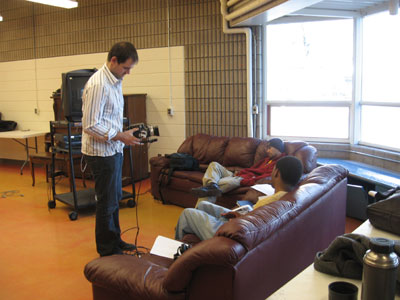
The videography workshop
When I visited the group was set up in a big classroom and studying
how to use video equipment. I did not want to interrupt them so
I pulled aside one the staff people to find out further information
about the program. I ended up talking to Sarah Mair,
a social work coop student from Ryerson University who is currently
spending some time at Scadding Court helping with the Outer
Limits project. She filled me in a little on some of the training
that had already taken place: the program participants have been
receiving training on how to teach English as a Second Language,
how to speak basic Bengali, even how to cook Bengali cuisine. The
participants have also been spending time learning photography and
videography techniques in order to learn how to document their amazing
experiences in India.
As I spent time talking with Sarah I realized that she is an interesting
individual in her own right. As the daughter of Jamaican immigrants
she has lived in different parts of Toronto, and as a person of
colour she has had her own experiences with Toronto’s ethnic
diversity. Sarah commented that she has had various key experiences
growing up when she has witnessed or been at the receiving end of
racial slurs. Sarah explained that especially during high school
students tend to quite naturally segregate along racial and ethnic
lines. She expressed that young people of colour often do not receive
the same opportunities and found that her situation improved when
she started attending a black-focussed school. An after school black-focussed
program helped her develop a sense of pride and identity as a person
of colour. Sarah added that persons of colour are often alienated
by a Euro-centric curriculum, and towards the end of her high school
years she noticed considerable tension among students of different
backgrounds.
Based on her own experiences, Sarah has decided to make her own
contributions to improving this situation, and through a career
in social work she is planning to help marginalized individuals
and people of colour. But she plans to go even further and move
into the field of policy making and down the road might even consider
politics, in order to make an active contribution towards creating
more respect and tolerance for people of all backgrounds. She added
that during a recent visit to a Toronto-area mall, a friend from
Ohio commented on the astounding ethnic diversity in Toronto, a
society unlike any other. In her and her friend’s opinion
even New York City does not compare to the ethnic diversity that
you see right here in Toronto.
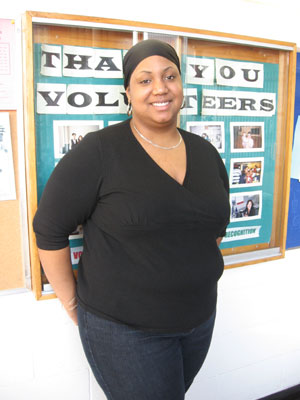
Sarah Mair
Sarah feels very strongly about her desire to become involved in
anti-racism and anti-oppression work. She wonders what makes us
so silent and hesitant to bring about change, and plans to raise
awareness for these issues. She mentioned that there are still many
institutional problems with racism and it’s going to be a
long road ahead yet to eradicate it, but fortunately there are many
agencies in Toronto whose work is dedicated towards this cause and
we are making progress.
Sarah’s passion impressed me, particularly when she explained
that she has a severe hearing disability and during her childhood
doctors had told her that she would never be able to talk. She added
that due to her hearing disability, so many people have helped her
in the past, and now she wants to become active to give back to
the community.
The video workshop was taking a break for lunch, and this was my
time to get to know some of the other players in the Outer Limits
program. I had a chance to catch up with Shawn Thompson,
a participant in the program who will be going to India in just
a few days.
Shawn was born in Canada of Jamaican parents, and at 23 he is the
oldest child in his family with a 21-year old brother and a 16-year
old sister. He proudly talks of his brother who received a basketball
scholarship to Tallahassee. With his brother out of the house, things
are a lot quieter at home and he wonders how his sister will handle
his three-month absence in India.
Shawn grew up in Toronto’s Kingston Road / Galloway Court
area, locally known as a very rough area marred by drugs, prostitution
and violence. As an insider, Shawn actually feels that the neighbourhood
has gotten better. Despite recent improvements, the area still has
a rough image and he mentioned that even police officers have more
respect for you when you mention you are from that area.
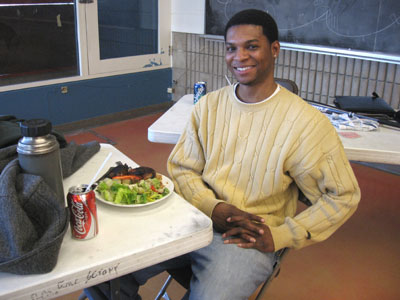
Shawn Thompson
From 4 to 9 pm he works in a local community centre in an after-school
drop-in program. Children age 6 and up as well as adults drop by
for sports activities, to use the gym and the swimming pool. Of
the children Shawn says that “these are kind of my kids”.
He feels like a father figure and sometimes catches the kids imitating
some of his unique sayings. He is very aware of the influence he
has on these young people and is worried about what is going to
happen to them when he leaves. Shawn wonders who is going to take
over his mentor role in his absence.
He describes his communication style with the kids as very comfortable
and says that these kids are his friends. Admittedly he has not
had the best upbringing himself and often tries to do things differently
from what he saw as a child. He goes on to say that he sometimes
makes good-natured fun of the kids, but is never critical. His attachment
to his charges becomes evident when he says that “these kids
give trouble, but they are good kids, they are like “little
men”.
It was only through a fluke that Shawn linked up with the Outer
Limits project. He was going through a rough patch, problems
in a personal relationship. He took two days off work and was going
take a third day off when his supervisor phoned him and they started
to talk about how Shawn’s life had been stagnating. Shawn
admitted that he was going through a confusing time, and that was
when his supervisor asked him if he would like to go to India.
Shawn recalls that he only ever had seen images of the Taj Mahal,
his only exposure to India. His supervisor said he had two hours
to make a life-changing decision, so Shawn talked it over with his
mom who said “go – get out of the house”. Shawn
still wasn’t 100% sure and waited until his supervisor called
him back. They talked, Shawn was reluctant, saying that he needed
more information. He met Kevin Lee, Scadding
Court Community Centre’s Executive Director on a Saturday
and Shawn started the preparation program just two days later on
a Monday.
When asked about the program Shawn says that he finds it quite
tiring since he is used to sleeping in for his afternoon job. It
has taken some time to get used to the new routine, but the “people
are good”. He added he really likes the school which has made
learning very easy for him.
When thinking about India and his expectations, Shawn admits he
doesn’t know what to expect of the poverty, the culture shock
and the reverse culture shock that he might experience upon his
return. He is a little worried because he takes things to heart
and may start to resent it when people around here complain about
things they don’t have when in reality they have so much.
Even just attending the training has changed him. The videography
and photography training has been great, and he has really developed
an idea of helping people. The training has made him aware of the
abundance that he has, referring to his high school education, his
job, his income. This project has allowed him to see that.
Shawn’s goal for his time in India is to just learn, not
to impose. In a spirit of intercultural exchange he says “I
want to give them what I know and take what they know”. He
is planning to bring some of his music to show the Indian children
what he and his friends listen to here. And he will bring video
footage of Toronto to share his home town with them as well.
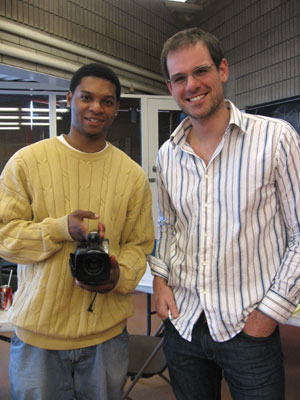
Shawn with Philip Maglieri
This young man spoke so calmly and eloquently and with a quiet
conviction, and the few people who were in the room all commented
on how touched they were by his statements. Philip Maglieri,
the videography instructor, was in the room as well and had been
filming Shawn as he spoke. He was next on my interview list.
Philip finished film school in 2000 and has been creating corporate
and public sector videos over the last few years. Among other projects,
he has completed a documentary on homeless Methadone patients, illustrating
the problems that can arise when legal drugs are used for illegal
means. He recently quit his job working with the Ministry of Finance
and started working on a feature film which he isn’t ready
to discuss yet.
Last summer Philip approached the Scadding Court Community Centre
to offer video lessons and was taken up on his offer later in the
fall. Philip’s goal is only to pass his knowledge on, he did
not want to make the documentary himself. He is interested in the
participants' stories, but only if they want to tell them. His primary
role will be to help put together the video footage after the trip
for a documentary produced by the participants themselves.
Terry Smith has been accompanying the participants
for the last few weeks. His responsibility has been to teach the
young men how to teach English as a Second Language. Before Terry
retired early from his position as a teacher with the Toronto District
School Board he was working in a special program dedicated towards
what he calls “hard-core non attenders”. Often these
young people come from low-income neighbourhoods, have issues such
as learning disabilities, low self-esteem, abuse at home, obsessive/compulsive
disorder or anxiety issues.
In this role his approach was to work on the underlying problems,
often this involved making referrals to the health care system or
even the court system. Once these fundamental problems were addressed
the students’ attendance returned to 100% in many cases. Students
felt comfortable in the friendly non-traditional surroundings where
classes were located at the Scadding Court Community Centre, and
they enjoyed this non-judgmental environment. Often the role of
these specialized teachers is to model behaviour such as conflict
resolution or communication skills in general.
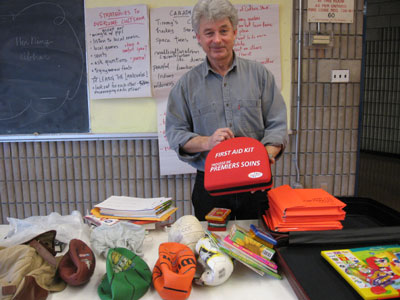
Terry Smith
Terry connected with the Outer Limits program through
his link with Scadding Court and he has been providing ESL training
as well as goal setting and life planning to the participants since
the first week of December. He will also accompany the group to
India where he will offer counseling services and be responsible
for administrative issues and trouble-shooting for the entire three
months.
More than 30 years ago Terry himself travelled to India, and just
in January and February of 2006 he had a chance to go back to this
fascinating country and went backpacking with his wife. He flew
into Bombay (Mumbai) and travelled all the way up to the Himalayas.
During these trips he gathered a number of impressions of Indian
people: he experienced them as very warm, friendly and generous
and felt that they were genuinely interested in getting to know
you on a more profound level. Terry added that the distance is broken
a lot quicker in India and there is a lot of joy, noise and celebration.
He was humbled by the complexity of Indian culture, and the ingenuity,
energy and industry of the poor people.
Terry explained that the four Toronto participants will initially
be teaching in teams of two, and later split up and be given their
own groups. They will be teaching English as a Second Language to
a total of about 50 children who range in age from 4 to 14. Terry
really believes in this innovative approach and says that many other
intervention programs fail. This program reaches young people at
transitional points in their life, reaches in deep and allows for
profound personal growth.
He also explained to me a variety of items on a display table that
the group will be taking to India with them: first and foremost
anti-malarial pills, ESL teaching aids and games for the children
as well as sports equipment for football, soccer, basketball and
baseball which will give the Toronto participants a chance to play
sports with the Indian children. Big emphasis will be placed on
inter-cultural connections. Terry added that he can tell the young
men are ready to go and he is very excited to be part of this opportunity.
Yusdel Amaro Hidalgo, a 24-year old Cuban born
man, is also one of the participants in the Outer Limits
program. I initially approached him in Spanish, my favourite language,
and told him that I spent 16 days in
Cuba in April of 2005. Cuba has been one of my most interesting
travel experiences to date and I fondly recall my time in Havana
and the things I learned about this unique culture.
Yusdel talked about his childhood and adolescence in Havana and
spoke of a very strong sense of community. He had a great social
network and close friends and enjoyed many good times growing up.
About six years ago he arrived in Toronto, by then in his late teens,
to be reunited with his father, a Cuban filmmaker, who had relocated
to Toronto several years earlier. He was now together with his father
and sister in Toronto while his mother has stayed in Cuba. Being
reunited with his dad was great for Yusdel since he had not seen
much of his father for about six years.
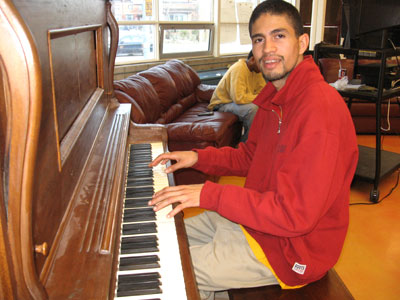
Yusdel Amaro Hidalgo
At the beginning he spoke very little English and spent a lot of
time working on his language skills in ESL programs. His early years
in Toronto were difficult because he missed this sense of community.
Although there is a fairly large number of Cubans in Toronto they
live fairly dispersed throughout the city, and the sense of community
that you see in the streets of Havana simply does not exist here
in North America. Despite his linguistic challenges, Yusdel finished
high school in three years, sometimes studying with students that
were four or five years younger than him.
One of most significant experiences of culture shock for him were
that here in Toronto it was not socially acceptable to compliment
good-looking women as it would be totally normal in Havana. He learned
that inappropriate comments or gestures could be interpreted as
sexual harassment and could lead to severe consequences. I agreed
with him that these cultural differences exist, and looked at it
from the other perspective: when a woman travels to Cuba it certainly
takes some time to get used to the come-ons, the comments, the catcalls
and the whistles. For many North American women this behaviour may
come across either as flattering, annoying or even threatening while
for a Cuban woman it would be absolutely normal. There is no doubt
that these cultural differences exist and that it takes a while
to get used to new ways of doing things.
Since completing high school Yusdel has been working in various
jobs. Due to his father’s training he spent some time in the
film industry as a sound technician. He has also worked in the hospitality
industry, in construction and in various community programs. More
recently he has been working with Toronto’s Park and Recreation
Department.
For Yusdel it will not be the first time in India: he already went
there in 2003 for an international benefit concert. Scadding
Court had organized this concert several years ago and as Yusdel
is currently at a crossroads in his life, they invited him to participate
in the Outer Limits program. In 2003 Yusdel spent 21 days in India
and when he was approached to participate in the Outer Limits program
he immediately thought he’d like to go back to India again.
During the training program he has learned a lot about such diverse
topics as racism, social class, community work, relationship skills,
film making and photography, and he has gained a whole new perspective
of life. He admits that it is finally starting to sink in, that
he will be going to India in just a few days. He is looking forward
to going and can’t wait to go. He wants to learn as much as
he can about the people and the culture and hopes that doors will
open and that he will be able to apply the lessons he is going to
learn there to his life in the future.
Tessefa Francis, a 27 year old Torontonian will
also be going to India. His parents came to Toronto from Kingston,
Jamaica, and Tess, as he is known by all his friends, grew up in
different parts across Toronto. Some of the neighbourhoods and the
public housing projects he grew up in were quite rough and he witnessed
a lot of violence. Nevertheless, he says he had a normal childhood,
adding that in the winter he and his friends played outside until
their feet were cold. Tess admits that during high school he was
more into the fun than the academics, school was definitely secondary,
and he scraped by as far as his grades were concerned.
After high school he started a program in business administration
at Seneca College, but realized that it wasn’t his thing and
dropped out after the first year. He then took a program in video
editing at the Academy of Design because he wanted to do something
creative. For several months he worked on a special project for
the National Film Board – a documentary with a title along
the lines of “The Making of a Hip-Hop Dancer” where
he had an opportunity to shadow the video editor. One thing he learned
was that you can never have enough footage.
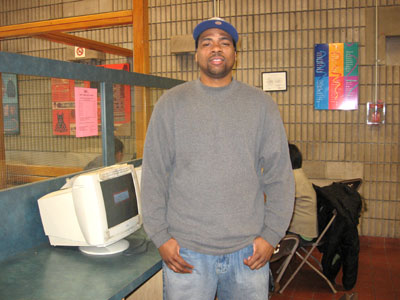
Tessefa Francis
So far this has been Tess’ only exposure to the film industry.
He said that he tried to apply for various opportunities in the
industry, but ponders that he may not have put in enough effort.
He has also been working with the City of Toronto Parks and Recreation
Department during the summer, doing outside gardening work in the
parks. He adds that he doesn’t mind working outside, and during
the winters he has been looking for work.
Tess connected with the Outer Limits program when a friend
called him out of the blue, saying that the program needed a person
with a post-production background. The preparation for this program
in India has opened his mind about issues such as culture shock,
oppression, economics and politics.
Reflecting on the situation of visible minorities in Canada, Tess
said that in middle school he had friends from every nation, but
during high school teenagers started to socialize more within their
own racial and ethnic groups. He commented that he has faced some
of the stereotypes commonly targeted at black males, for example
women will clutch their purses in his presence, and shopkeepers
step up their surveillance. There is no doubt that you stand out
as a visible minority, but at the same time he shrugs and says you
just have to deal with it and not let it discourage you.
As far as his stay in India is concerned, Tess hopes to come back
with a sense of accomplishment, a new perspective on life, and hungrier.
He admits that there are many less fortunate, less privileged people
out there and concludes there is a lot of opportunity, you just
have to grab it. Tess has never really travelled much before, so
he admits he is a little nervous, yet excited about this new venture
ahead of him.
Levis Adjetey was born in Ghana 26 years ago and
came to Toronto at the age of eight. About his time in Ghana he
remembers a sense of warmth and community growing up and he found
that when people have less they become a lot more creative. It was
snowing when Levis first set foot on Canadian soil, and he remembers
being unimaginably cold.
The first few years were difficult for Levis who did not speak
English when he first came here. During his early years he had a
strong accent and was bullied by one his classmates. Today he is
very articulate and his English is completely accent-free.
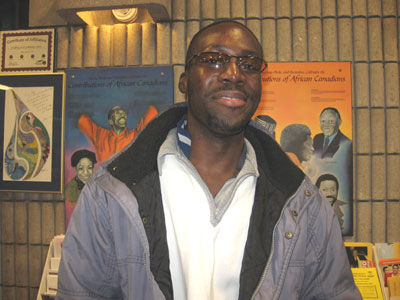
Levis Adjetey
Levis liked high school, he played a variety of sports including
basketball and was on different sports teams and also got involved
in arts. After graduating he went to Humber College and took a one-year
program called “Design Foundations” which prepares students
for academic studies in a variety of design-related careers. He
left the program after one year and went to an animation school
for about a year and half, but did not finish that program. Instead
he took the first year of a program in drywall finishing, but ran
out of funds and had to start working.
He works with the Toronto Community Housing Corporation supervising
children in an arts and crafts program. Although he enjoys working
there this job does not pay a lot and is not a long-term career
option. His manager knew Kevin Lee and mentioned the India project
to Levis. His first reaction was shock, he was caught off guard,
but upon reflecting on this opportunity he decided to go.
Levis has found the first few weeks of training very educational
and has learned a lot about India and its caste system, even the
food. He is looking forward to communicating with the Indian children
and learning about their lives. At this stage he said he just wants
to get there. His feelings are a bit mixed and he is not sure what
to expect. As far as social problems are concerned, he concludes
that there are similar issues everywhere.
He hopes that he can give a child something that will stay with
them and expects to come back with lots of pictures and stories
and a love for India. Levis figures it’s going to be a life-changing
experience.
Last but not least I had a chance to talk with David Trattles,
the photographer who has been teaching the participants essential
photo skills in order for them to be able to document their experiences
in India. David is a real character, a unique, off-beat individual
with a great sense of humour who spends much of his year outside
of Canada.
On a recent trip to India he purchased a bike locally for $20 and
rode it across the country to Calcutta (Kolkata) where he started
to do a photo documentary on a group of Muslim women boxers who
got into boxing in order to create more diverse work opportunities
for Muslim women. David specializes in stories on marginalized people
and creates multi-media shows of his experiences. He has done work
for CIDA, Canada’s International Development Agency and worked
with AIDS victims in Zambia. Other projects took him to Central
and South America. In total David has visited more than 80 countries
across the world.
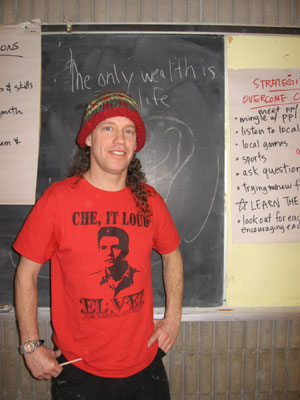
David Trattles
David also does a lot of work with schools and his photo presentations
introduce the public to the world as he sees it. He has done photo
essays for Canadian Geographic and the CBC who ran a half-hour television
program about his assignment in Newfoundland. Elle Magazine recently
ran a story about David and the Muslim women boxers that he is working
with.
When in Canada, David lives a very simple life. He considers himself
the luckiest guy in the world when he is riding through India on
a bicycle, free from luxuries and materialism, and free to discover
and connect with locals who he characterizes as some of the warmest
people on this planet. He commented that in a place like India "you
feel your eyes are too small".
In addition, David runs an adventure photo tour company called
www.photomediterraneo.com
that provides guided tours to Sicily, Spain, Malta and Tunisia.
Special highlights of these tours include the Tomatina – Spain’s
famous tomato throwing festival, the magic of Sicily including the
cheese rolling event, the wood-top-spinning event, local processions
and dinners with local hosts, and discoveries of Malta as well as
camel riding in the Tunisian Sahara. The emphasis of David’s
photo adventure tours is on attracting fun-loving people and getting
them involved in some unique local activities to enjoy great food,
friendly locals, unusual special events and spectacular scenery.
The more I read about David’s programs the more I thought
that one day I’ve gotta go on one of these tours myself…
As far as the Outer Limits project is concerned, David
did not want to teach the participants too much and restrict their
creative expression. He wanted their photography experience to be
self-directed so they can present reality as they see it and encourage
them to look at the world with open eyes. He feels strongly that
this program will encourage them to broaden their mind and help
them reflect on their options in life. David says that getting exposed
to India really deconstructs one’s privilege and teaches how
important a sense of community and family is in so many places around
the world, something that is often lacking in our Western developed
nations.
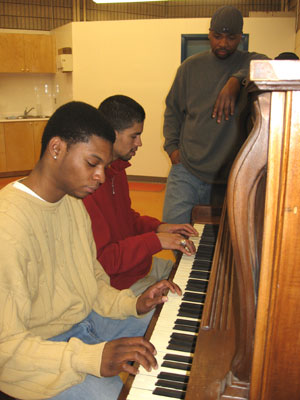
Shawn, Yusdel and Tess, enjoying some music
After my interview with David I returned into the classroom where
I was watching Yusdel on the piano, teaching some of his musical
knowledge to his co-students. He even tried to teach me some chords
for playing salsa. David entertained the crowd with his jokes and
he is quite a talented comedian, producing his knock-knock jokes
alternatingly with a (rather authentic) Irish, Indian or German
accent. The atmosphere was upbeat and optimistic, and for me this
had been a day of great fun.
As I observed the young men, I saw so much potential and so much
hope, and this day at Scadding Court Community Centre inspired me
to seriously consider traveling to India myself to visit the Outer
Limits program first hand and see this Toronto-Kolkata collaboration
in action. As the year progresses, I will have an opportunity to
work closely with the team from Scadding
Court on a big fundraising event to raise money for this innovative
program that is promising to change lives on both sides of the planet.
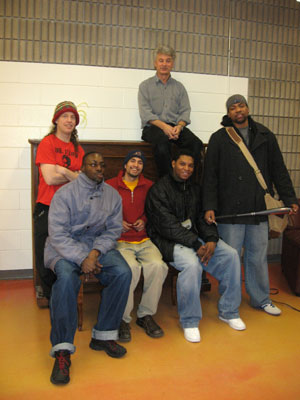
The crew from the Outer Limits program
Amazing things can happen when a group of committed people get
together and put their minds together to foster and develop human
potential on both sides of the globe.
Related Articles:
The Scadding Court Community
Centre Uses International Travel and Cross-Cultural Learning To
Help At-Risk Youth
|